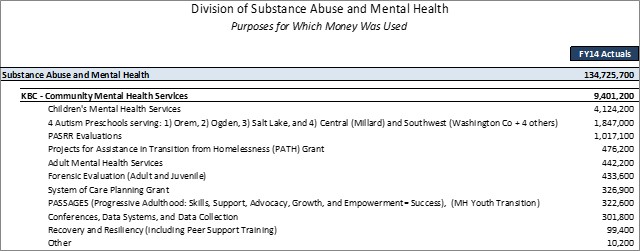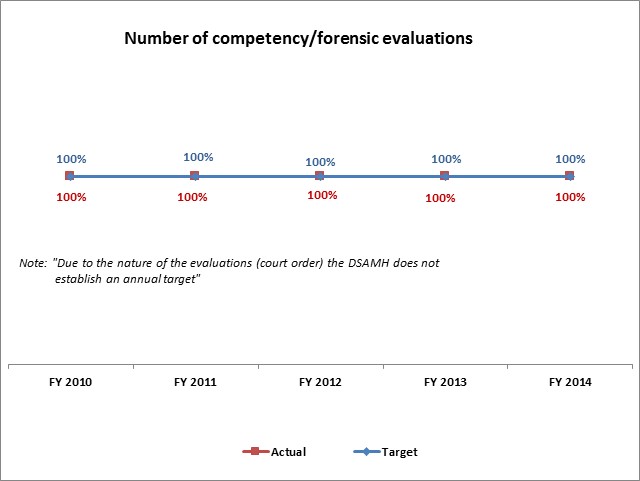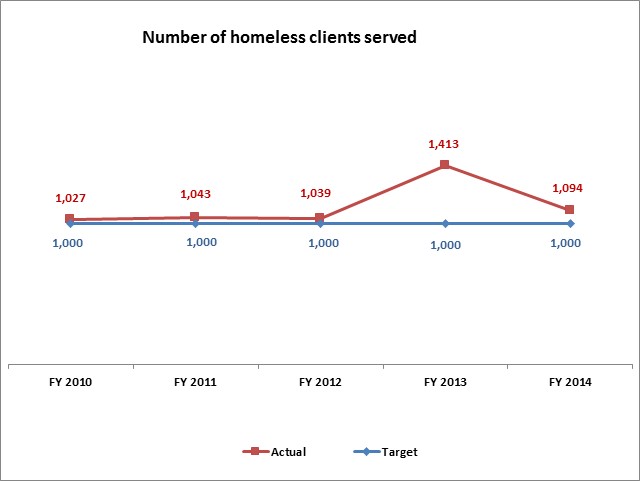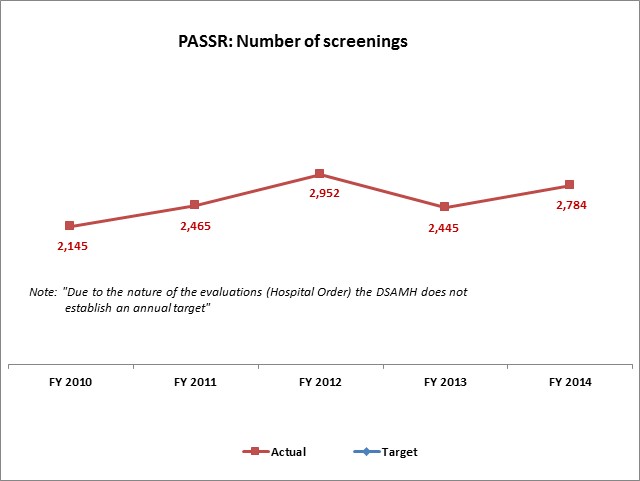The Community Mental Health Services program develops, coordinates, and evaluates mental health services.
During the 2015 General Session, the Legislature appropriated for Fiscal Year 2016, $13,368,500 from all sources for Community Mental Health Services. This is a 27.4 percent reduction from Fiscal Year 2015 revised estimated amounts from all sources. The total includes $7,075,300 from the General/Education Funds, a reduction of 17.1 percent from revised Fiscal Year 2015 estimates.
In addition to statewide compensation and internal service fund cost increases, the following appropriation adjustments were made during the 2015 General Session:
For the most recent completed fiscal year, the following information represents the purposes for which the money was used:




Regarding the positive trend greater than 5% in its PASSR screenings performance measure, the agency states, "PASRR evaluations aid in the treatment and review process for individuals with mental illness in Medicaid Certified nursing facilities and is mandated by the federal government as part of the Federal Omnibus Budget Reconciliation Act. According to the US Census Bureau the population of people age 65 and older grew from 190,222 in 2000 to 249,462 in 2010, a 31% increase while the general population in Utah has increased 23% from 2000 to 2010. This dramatic growth has had a significant impact on the PASRR program and the number of PASRR evaluations requested and completed. DSAMH projects that need will continue to grow and additional funds will be needed to meet the increasing need in the future . . . PASRR evaluations aid in the treatment and review process for individuals with mental illness in Medicaid Certified nursing facilities and is mandated by the federal government as part of the Federal Omnibus Budget Reconciliation Act. According to the US Census Bureau the population of people age 65 and older in Utah grew 31% between the 2000 and 2010 census while the general population in Utah increased 23% during the same time period. This dramatic growth (31%) has had a significant impact on the PASRR program and the number of PASRR evaluations requested and completed. The growth in evaluations is directly correlated with the increase in the aging population. DSAMH projects that as the population 65 and older continues to increase so will the need for PASRR funds and we assume additional funding will be needed in future years to meet future growth."
The program is funded with the following federal grants:
- Homeless Mentally Ill: The division distributes this federal PATH grant to mental health centers for specialized services to the homeless mentally ill. This is an annual grant.
- Mental Health Block Grant: This grant, most of which is passed through to the local mental health authorities on a formula basis, provides funding for the development of a statewide system of care for adults with serious mental illness and children with serious emotional disturbances.
- Passages Grant: A new SAMHSA grant awarded to DSAMH on October 1, 2009 for the development of transition to adult living services for young adults with serious emotional disturbance in two of Utah's most rural counties - San Juan and Tooele. This grant expired September 30, 2014 but a new grant is pending.
- System of Care Expansion Planning Grant: A new SAMHSA grant awarded to DSAMH on July 1, 2012 to develop a comprehensive strategic plan for improving and expanding services provided by systems of care for children and youth with serious emotional disturbances and their families.
The following state-funded programs are also budgeted in this program:
- Competency Evaluations for Adults and Juveniles: The state is responsible for determining an individual's competency to stand trial for a crime. The Division contracts with forensic evaluators to perform the evaluations for children/youth and adults.
- Omnibus Budget Reconciliation Act (OBRA) of 1987: This act requires the state to assess the appropriateness of placement for mentally ill persons residing in nursing facilities. This assessment is done using the Preadmission Screening and Resident Review (PASRR).
- Pre-school Autism Program: This program provides funds to several areas of the state to develop and operate programs for pre-school children with autism.
COBI contains unaudited data as presented to the Legislature by state agencies at the time of publication. For audited financial data see the State of Utah's Comprehensive Annual Financial Reports.